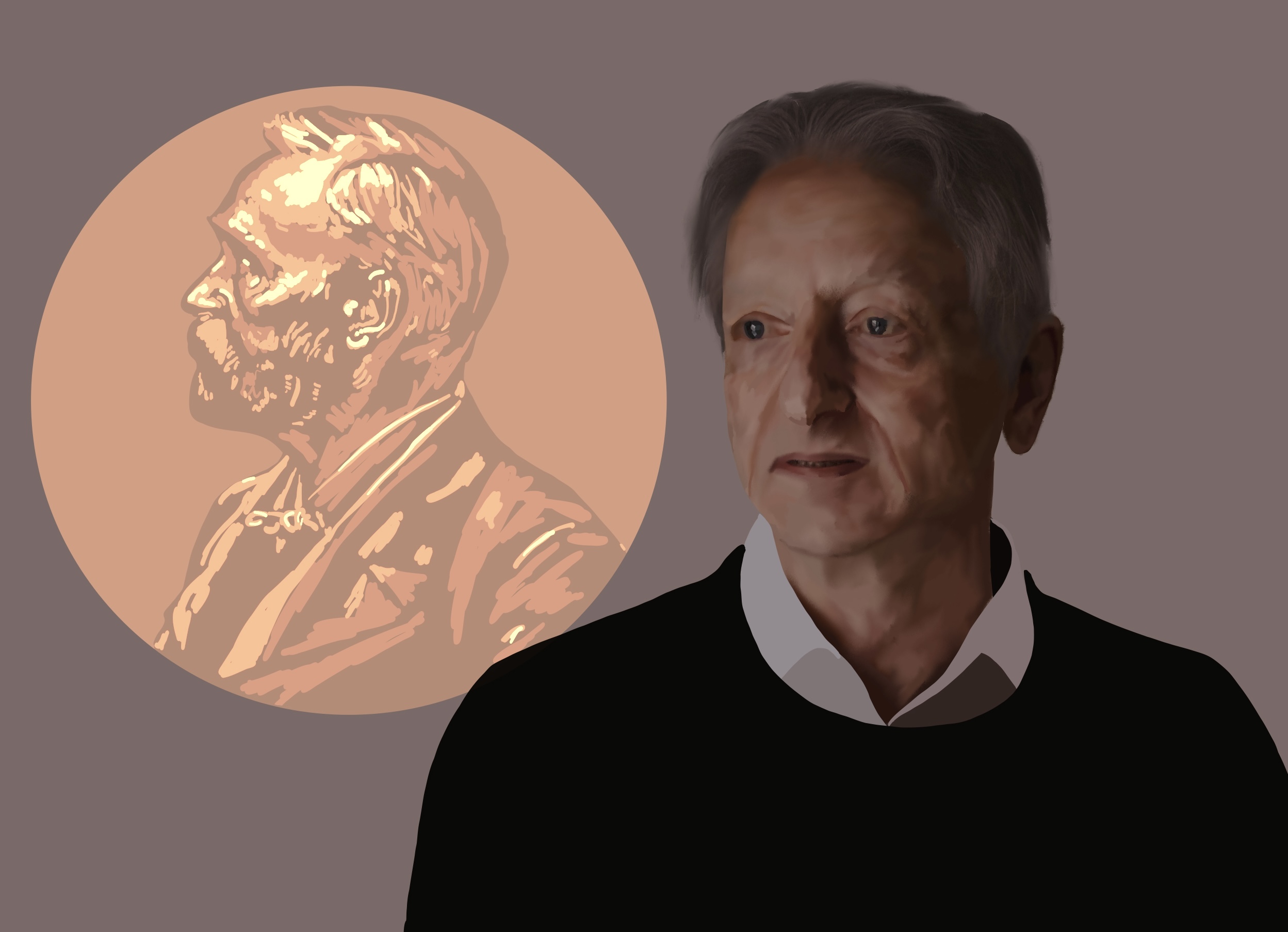U of T Professor Geoffrey Hinton awarded the Nobel Prize in Physics
The award has shone a spotlight on Professor Hinton’s extremely impactful work and has been accompanied by copious congratulations from educators and leaders across the world.
On October 8, University of Toronto (U of T) Professor Emeritus of Computer Science Geoffrey Hinton was awarded the 2024 Nobel Prize in Physics alongside Princeton Professor John J. Hopfield for “foundational discoveries and inventions that enable machine learning with artificial neural networks,” according to the award’s press release.
Professor Hinton won the prize for specifically building on Hopfield’s work and developing the Boltzmann machine, which, according to the press release, “can autonomously find properties in data, and so perform tasks such as identifying specific elements in pictures.”
The machine’s impact “has already been of the greatest benefit,” said Ellen Moons, Chair of the Nobel Committee of Physics, by how it has contributed to the current explosion in artificial intelligence (AI) and its many applications, which include large language models like OpenAI’s ChatGPT and Google’s Gemini.
Revered as the “godfather of AI” for his work in developing artificial neural networks, Professor Hinton is “internationally renowned as a pioneer in the field of deep learning,” which is considered one of the most influential scientific endeavours today.
Professor Hinton, who was born in England, completed his PhD in 1978 from the University of Edinburgh in England before working in English and American universities prior to moving to Canada, where he joined U of T in 1987.
Professor Hinton has supported the Canadian Institute For Advanced Research, co-founded and serves as the chief scientific advisor of the Toronto-based AI research non-profit, the Vector Institute, and American tech giant Google, which he left in 2023, citing his desire to speak freely about the risks of AI.
The announcement of Professor Hinton’s awarding of the Nobel Prize put international attention on Professor Hinton and his work and initiated an onslaught of congratulatory messages.
U of T President Meric Gertler stated that he was “absolutely delighted to congratulate [Professor Hinton] on receiving the 2024 Nobel Prize in Physics” and that “one cannot overstate the impact of a win like this on the ability of Canada, Toronto, and the University of Toronto to be able to welcome talented newcomers, great students and wonderful faculty from across the country and around the world because of the recognition that arises with Geoff’s win.”
Canadian Prime Minister Justin Trudeau called Professor Hinton in a statement on October 8 a “stalwart in his field” and an “outspoken advocate for the responsible development and adoption of AI, educating the world about the benefits and challenges this technology poses.”
Professor Hinton also was congratulated by esteemed institutions and organizations such as his alma mater, Cambridge University, the Royal Society, and the Alan Turing Institute. He was also congratulated by learning and government leaders, like Stanford Professor and C0-Founder and Co-Chairman of learning platform Coursera Andrew Ng, Professor Hinton’s former doctoral student and co-founder of OpenAI, Ilya Sutskever, and Canadian Minister of Innovation, Science and Industry François-Phillipe Champagne.
Interestingly, despite the worldwide attention to AI development, which Professor Hinton believes will “exceed our intellectual capabilities,” such positive sentiment concerning the prospects of AI in the 1990s was rare, leaving Professor Hinton to persist in his research despite how “many researchers lost interest in artificial neural networks,” according to the Royal Swedish Academy of Sciences.
In a virtual press conference hosted by U of T, Professor Hinton spoke on this, stating that it was “slightly annoying that many people—in fact, most people in the field of AI—said that neural networks would never work.”
Professor Hinton also discussed how he hopes “AI will lead to tremendous benefits…and to a better life for everybody” but also spoke of the need for more research on AI safety as “we don’t know how to avoid [catastrophic AI scenarios] at present.”
On October 10, Professor Hinton was honoured at a U of T event in the Schwartz Reisman Innovation Campus, which featured various dignitaries, scholars, and university leaders, including 1986 Nobel Prize in Chemistry recipient, University Professor Emeritus John Polanyi, Canadian Deputy Prime Minister Chrystia Freeland, and copious AI researchers and scholars from U of T, the Vector institute, and Google.
The event saw Professor Hinton share valuable memories of his research work and reference a variety of individuals, including his “brilliant graduate students and post-docs” and late Stanford psychologist David Rumelhart, who Professor Hinton believes “should have won the Nobel Prize.”
Speaking on Professor Hinton’s accomplishments, Chrystia Freeland noted how she was “constantly struck by how Geoff thinks about the bigger implications of his ideas and how Geoff thinks about really wanting to make Canada and the world a better place.”
President Gertler compared Professor Hinton as “one of the great minds of the 21st century,” who “literally created new ways of thinking about thinking and learning.”
News Editor (Volume 51); Associate News Editor (Volume 50) — Samuel is a second-year student at UTM studying Politics and English. He previously worked with The Medium as an Associate News Editor and currently serves as the publication’s News Editor. Samuel is passionate about employing the power of writing to enhance our student community and hopes to help nurture a bright future for The Medium this year. In his spare time, Samuel can be found working out, creating music on the piano and drums, or exploring nature.


